P. T. Forsyth Collection (24 vols.)
Digital Logos Edition
Overview
Most people make so little personal use of the Bible that they do not know if an interesting preacher is preaching the Gospel or not. The real strength of a church is not the amount of its work but the quality of its faith. One man who truly knows his Bible is worth more to a church’s real strength than a crowd of workers who do not.
—P. T. Forsyth, Lectures on the Church and the Sacraments
The P. T. Forsyth Collection brings together 24 works from this celebrated Scottish theologian and preacher. After studying at the University of Göttingen under the notable theologian Albrecht Ritschl, Forsyth went on to become one of the early twentieth century’s most influential theologians—his ideas are largely thought to have anticipated, and mirrored, the neo-orthodox movement of Karl Barth and Emil Brunner.
The P. T. Forsyth Collection includes Forsyth’s best-known works, including The Cruciality of the Cross, his strong plea for the orthodox doctrine of atonement, and The Justification of God, a moving collection of lectures written at the height of World War I, when many Christians were having trouble reconciling their faith in God with the horrors of war. In This Life and the Next, Forsyth studies the doctrine of immortality and its impact on our current lives. Christ on Parnassus contains lectures on the connection between art and religion. The still-popular Positive Preaching and Modern Mind contains advice to future ministers—advice still relevant for and needed by today’s teachers and preachers.
Also included is the The Holy Father and the Living Christ, Christian Perfection, and The Taste of Death and the Life of Grace, which were later reprinted in a single volume titled God the Holy Father, as well as The Principle of Authority in Relation to Certainty, Sanctity and Society, which was later republished as The Church, the Gospel, and Society.
Plus, there are works that examine the doctrine of Christ’s divinity, the connection between economics and the church, the ethics of war and Christianity, and much more. In the Logos Bible Software edition, all Scripture passages in the P. T. Forsyth Collection are tagged to appear on mouseover. For scholarly work or personal Bible study, this makes these resources more powerful and easier to access than ever before. Perform powerful searches by topic or Scripture reference—finding, for example, every mention of “resurrection” or “Mark 9:2.”

- 24 works by celebrated author, minister, and professor P. T. Forsyth
- Dozens of sermons, lectures, addresses, and more
- Completely searchable content linked to the other resources in your Logos library
- Title: P. T. Forsyth Collection
- Volumes: 24
- Pages: 5,159
- The Charter of the Church
- The Christian Ethic of War
- The Justification of God: Lectures for War-Time on a Christian Theodicy
- The Roots of a World Commonwealth
- Christian Perfection
- Rome, Reform, and Reaction
- Socialism, the Church and the Poor
- Christ on Parnassus: Lectures on Art, Ethic, and Theology
- The Cruciality of the Cross
- The Person and Place of Jesus Christ
- Faith, Freedom, and the Future
- Lectures on the Church and the Sacraments
- Marriage: Its Ethic and Religion
- Missions in State and Church
- Positive Preaching and Modern Mind
- The Power of Prayer
- The Principle of Authority in Relation to Certainty, Sanctity and Society
- Religion in Recent Art
- Theology in Church and State
- This Life and the Next
- The Work of Christ
- The Holy Father and the Living Christ
- The Taste of Death and the Life of Grace
- Pulpit Parables for Young Hearers
This title is included in the following collections
You can save when you purchase this product as part of a collection.
Logos 7 Reformed Diamond Legac...
$2,999.99$2,999.99Logos 7 Reformed Portfolio Leg...
$4,749.99$4,749.99Logos 7 Collector's Edition Le...
$11,399.99$11,399.99Logos 6 Collector's Edition Le...
$11,399.99$11,399.99
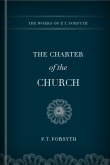
“If grace be absolutely free, so must faith be. If it be redeeming grace, its product must be a redeemed—a liberated faith. If faith obey another power than God’s grace, or if it do not deal directly with God’s grace, with Jesus Christ, with the Holy Ghost, it is an enslaved faith—even if it is broad enough to hold all the population and all the heresies.” The Charter of the Church is a clear and spirited exposition of the position of the Nonconformist Churches in England, given in a series of six lectures. The lectures are as follows:
- Our Historic Principle: The Unity, Autonomy, and Continuity of the Church
- Our Root Is Religious—in Faith and Free Grace
- Faith Demands a Church—but Catholic, not Monopolist
- We Disown the Prince, the Prelate, the Priest—and the Individualist
- The European History of Our Principle
- The European History of Our Principle (continued)
Dr. Forsyth has done excellent service in directing attention to the religious and positive principles of Nonconformity. Nothing is more to be desired than that the younger teachers of our churches should have a clear understanding and a firm grasp of those truths on which the very existence of Nonconformity is based. By his conviction, his knowledge, his enthusiasm, Dr. Forsyth is well fitted to guide our thoughts on these great themes.
—British Weekly
The Charter of the Church by the Rev. P. T. Forsyth, DD, explains the position of religious dissent with great force and eloquence.
—Manchester Guardian
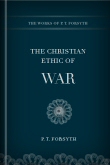
In The Christian Ethic of War, P. T. Forsyth looks to Christ’s atonement for the justification of war by Christians. “I do not aim here at expounding that Atonement, but at working out some of its moral implicates and results on the public and national side—a side on which a Christianity based only on Christ’s teaching has been criticized as defective.” He explores these results in the following chapters:
- Killing No Murder
- The Judgment of Crime by Crime
- War and Love
- Judgment By the Saints
- Passive Resistance
- The Moral Sanction of Force
- Christian Love as Public Righteousness
- Christian Ethic Lay and Historic
- Christian Ethic Historic and National
- Justification and Judgment
- The Judgment on the Cross and in the Field
If intelligent understanding of what one believes and why one believes it, profound sincerity of conviction and flaming earnestness of expression, are all the qualities which are needed to constitute a prophetic document, then Principal Forsyth’s books is emphatically a prophetic document.
—Biblical Review
The Christian Ethic of War is the work of a devout Christian and a deep thinker. It is a masterly exposition of a great theme, and places the moral issue of the present war on a lofty and inspiring plane.
—Daily Telegraph
In this volume the distinguished principal of Hackney College, London, exhibits, as in his Yale lectures on Positive Preaching and the Modern Mind, the noblest side of English and American Puritanism, a moral positivism strenuous for righteousness at whatever cost. His thesis and its great illustration by the cross are scrutinized from every angle of vision, and their teaching, developed to the uttermost, is hammered in again and again.
—Homiletic Review
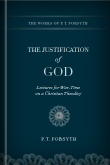
The Justification of God: Lectures for War-Time on a Christian Theodicy appeared during the height of World War I, when many Christians were having trouble reconciling their faith in God with the horrors of war. It is during such troubling times that the church is in need of competent leaders—those trained to minister during crises with a historical, universal, ethical, theological, and eternal understanding of the church. But The Justification of God is also a reassuring work, for in it Forsyth reiterates the eternal truths that Christ’s death on the cross has provided for us during hard times—even in times of war. “To justify God is the best and deepest way to fortify men. It provides the moral resource and stay which is the one thing at last. With open face to see the glory of God in things as they are, to blink nothing of the terror and yet to be sure of the Kingdom of God with all our heart—that is more for the courage of man than any nationalism or any patriotism when heart fails and grief benumbs.”
Of the many books which have appeared, written for the followers of Christ and discussing the bearing of this war on the church and Christian faith and practice, this seems to be the most searching and satisfying. The author’s grasp of the situation is large, whether dealing with its political, economic, or ethical aspects.
—Record of Christian Work
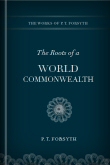
The Roots of a World Commonwealth is a pamphlet that appeared during World War I justifying England’s, and Christianity’s, participation in the war.
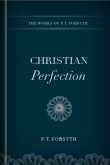
P. T. Forsyth’s study of Christian perfection begins with a discussion on the sin of the regenerate, both personal and in Scripture. It then examines the nature of faith and redemption. “To be perfect is to be in Christ Jesus by faith. It is the right relation to God in Christ, not the complete achievement of Christian character.” Forsyth then examines what it means to be faithful: humility, patience, thankfulness, prayer, duty, love—all are needed in the Christian’s pursuit of “perfection.”
A golden book full of deep and suggestive teaching expressed in a style that charms attention and provokes thought.
—London Quarterly Review
Dr. Forsyth has a keen insight that takes him beneath superficial formulas. His discourses are exceedingly able and suggestive, and his style is incisive and cultured.
—Glasgow Herald
The thought is keen and incisive, the expression deft and luminous, and the general purport at once stimulating and edifying.
—Aberdeen Free Press
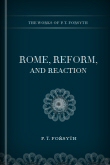
Rome, Reform, and Reaction contains four lectures by P. T. Forsyth which contrasts Protestantism and Roman Catholicism in their essential teachings and aims. Lectures include:
- What Is the Real Nature of the Present Issue?
- Where Do We Really Go When We Go Behind the Reformation?
- What Did Luther Really Do?
- The Real Nature of the Priesthood
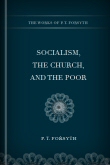
Socialism, the Church and the Poor is divided into two parts: “The Church and Socialism” and “Christ and the Poor.” In the first, Forsyth answers the question, What is the position and duty of the Church in relation to morals and economics? In the second, he argues that Jesus has been appropriated and exploited for political purposes. “It is not possible with due knowledge of the New Testament to hold that Jesus was above all things a social reformer.”
Dr. Forsyth is always stimulating, and this small book is packed with matter. Its charm and value is that it speaks out plainly as to certain obvious dangers which attend the social discussions of the time.
—London Quarterly Review
Dr. Forsyth writes with full knowledge of the present social situation and a firm grasp of Christian principles, and what he says may be commended to all who are perplexed by the problem of the right relation of the church to socialist ideals and aims. On the one hand, he properly insists that Christianity is no more wedded to the present competitive industrialism than it was to the previous feudalism; on the other, he warns the church against permitting itself to be exploited in the interests of any socialist program.
—Glasgow Herald
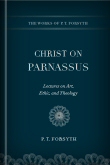
Art and religion have always been closely connected, and they have exerted on each other an influence which not only gives scope for a variety of opinion, but opens regions of inviting speculation on some of the rarest qualities and energies of the human spirit. In Christ on Parnassus, Forsyth broadly traces the progress of art under the influence of religion in certain phases of its existence. He first deals with Hellenic art and religion, then with Hebrew art and Religion, then with the growth and nature of Christian art, and then with the intrinsic bearing of Christianity on art—their natural relations rather than their past history. Forsyth also discusses architecture, music, and poetry.
The book is one which no preacher can afford to neglect. Each chapter opens a wide field for study and reflection.
—Homiletic Review
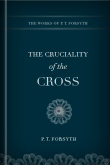
The Cruciality of the Cross is a strong plea for the orthodox doctrine of atonement, expiation, and propitiation. Forsyth views forgiveness through the atonement as essential to evangelical Christianity in respect to the New Testament Gospel, the Christian experience, and modern thought. He devotes a chapter to each of these themes and closes with a chapter on the moral meaning of the blood of Christ. “An evangelical Church has stood, and stands, not only for the supreme value of Christ’s death, but for its prime value as atonement to a holy God, and as the only atonement whereby man is just with God.”
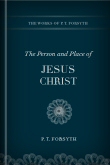
The Person and Place of Jesus Christ contains 12 lectures originally delivered to the Congregational Memorial Hall of London in 1909. The first 7 lectures discuss the deity of Christ and his place in the Christian religion. The remaining lectures examine the Christ’s preexistence, self-emptying, and self-fulfillment. Lectures include
- Lay Religion and Apostolic
- The Religion of Jesus and the Gospel of Christ
- The Greatness of Christ and the Interpretations Thereof
- The Testimony of Christ’s Self-Consciousness—Was He a Part of His Own Gospel?
- The Testimony of Apostolic Inspiration—in General
- The Testimony of Apostolic Inspiration—in Particular
- The Testimony of Experience in the Soul and in the Church
- The Moralizing of Dogma, Illustrated by the Omnipotence of God
- The Same Illustrated by the Absoluteness of Christ
- The Pre-existence of Christ
- The Kenosis or Self-Emptying of Christ
- The Plerosis or the Self-Fulfilment of Christ
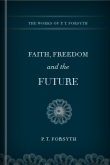
In the 12 lectures contained in Faith, Freedom, and the Future, Forsyth looks to the Anabaptists before the Reformation as key to understanding the Nonconformists of England and how the histories of both might be learned from in order to direct the future of the church. Lectures include:
- The Word and the Spirit
- Anabaptism and the Reformation
- Rational Spiritualism
- Anabaptism and Independency—Part 1
- Anabaptism and Independency—Part 2
- Particular Anabaptist Features in Independency
- The Limits and Dangers of the Anabaptist Element in Independency
- Liberty and Authority in Independency
- Independency and Its Creed
- The New Calvinism—Part 1
- The New Calvinism—Part 2
- The Genesis and Genius of Independency
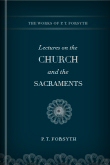
There is something which Roman Catholicism and Protestantism in their extreme forms underprize, and that is the Gospel as the power of a Holy God for our moral redemption in a kingdom. The Free Churches have tended to idolize liberty at the cost of the truth and power which makes liberty—at the cost therefore of reverence, penitence, and humility. The Catholic Churches have tended, on the other side, to idolize unity, to sacrifice the Church’s holiness to her catholicity, and to lose the moral power of the Gospel in a type of piety or in canonical correctness of procedure. They have sought unity in polity. That principle is here held to be fundamentally as wrong as the other, which seeks unity objectively in a mere moralism, or subjectively in a frame of mind. “As to the sacraments, it may be surmised that the writer holds a mere memorialism to be a more fatal error than the Mass, and a far less lovely.” This volume contains seven lectures on the church and seven lectures on the sacraments.
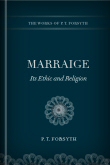
Marriage: Its Ethic and Religion is a revised and expanded lecture originally delivered to the National Council of Public Morals. It deals with the institution of marriage in all its aspects: historic, individual, social, and religious. He reviews the various substitutes that have been proposed for the Christian ideal and traces their consequences if put into practice.
It is equally strong in asserting the sacredness of marriage, the dignity and sincerity of true love, and the distinctly counteracting and evil effect along these lines of much of the literature of our day.
—Princeton Theological Review
The author of this volume is in the front rank of present day defenders of the faith. His pen is mightier than many swords and, like the flaming sword of the angel guarding the gates of Eden, it turns every way. When he writes of marriage it is in a way so lucid, so wise, and so convincing, that it leaves little to be desired.
—Union Seminary Magazine
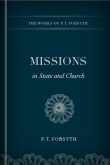
Missions in State and Church contains sermons and addresses on missions and missionary work. Forsyth addresses causes of missionary apathy, causes of missionary zeal, the national aspect of missions, the missionary’s staying power, and more. He presents Paul as the ultimate missionary model by examining his work of spreading the Gospel and mines Ezekiel 27:3–13 for lessons to be learned about the revival of modern missions.
These sermons and addresses of Principal Forsyth’s are full of large thoughts put with epigram and novel phrase, but with earnestness and serious intensity and with an informed, and on that account all the more profound, evangelical faith and hope.
—Record of Christian Work
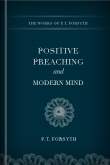
“The Christian preacher is not the successor of the Greek orator, but of the Hebrew prophet. The orator comes with but an inspiration, the prophet comes with a revelation.”Positive Preaching and Modern Mind is a series of lectures Forsyth delivered to students about to enter into the ministry. Three things are discussed in their various aspects in the nine lectures: the preacher, the gospel, and the age. For over one hundred years these lectures on preaching have remained popular. Lectures include:
- The Preacher and His Charter
- The Authority of the Preacher
- The Preacher and His Church, or, Preaching as Worship
- The Preacher and the Age
- The Preacher and Religious Reality
- Preaching Positive and Liberal
- Preaching Positive and Modern
- The Preacher and Modern Ethic
- The Moral Poignancy of the Cross
- Epilogue
The style, no less than the contents, is thought-provoking. We have read and re-read this book with great profit. It magnifies the office of the preacher. It clearly defines his message, and it analyzes the tendencies of our age with keen penetration. It cannot fail to be a source of instruction and inspiration to the student of theology and the minister of the gospel.
—Reformed Church Review
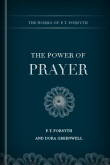
P. T. Forsyth and Dora Greenwell’s The Power of Prayer is divided into three parts. Dora Greenwell penned the first, “Prayer Considered in Its Relation to the Will of Man, and in Its Dependence on the Sacrifice of Christ’s Death,” in which she stresses two points in respect to prayer. First, it is more matter of will and freedom than we mostly think. And second, it is connected more directly and vitally than we realize with the cross of Christ. Forsyth authored the second and third parts, “Prayer as Incessant” and “Prayer as Insistent,” in which he emphasizes the need to pray often and strenuously.
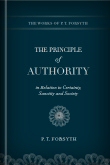
There is only one thing greater than liberty, and that is authority. The conviction in these pages is that the principle of authority is ultimately the whole religious question, that an authority of any practical kind draws its meaning and its right only from the soul’s relation to its God, and this is so not only for religion strictly so called, nor for a church, but for a public life, social life, and the whole history and career of humanity. Forsyth unfolds this thesis with reference to the nature and ground of certainty, to the character and real basis of sanctity, and to society as expressed in education and custom, in theology, the church, and the Bible.
It is a book for the times. It is tonic in its emphasis on the great ideas which alone can give strength to religion, and chiefly the Christian religion.
—Auburn Seminary Record
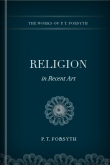
“The mutual relations between art and religion—why not at once say art and Christ?—form a very attractive subject of thought.” In Religion in Recent Art, Forsyth examines artists from the nineteenth century Pre-Raphaelite movement whose work is religious in spirit and being. This includes Dante Gabriel Rossetti, Edward Burne-Jones, George Frederic Watts, William Holman Hunt, and Richard Wagner. “Whatever may be thought of the technique of these artists, they are distinct and peculiar in this—that they are prophets as well as painters, and to no small extent apostles and martyrs.”
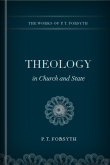
The theme of this volume is twofold. First, that the idea of the church and its supernatural life by a new creation is decaying in several of the churches that have been most critical about its relation to the state; whereas it is only a high and distinctive idea of the church that gives us any right or principle regarding that relation. And, second, that a true church is inseparable from a belief in certain doctrines for which men are ready to die—is, indeed, impossible without such belief; and the decay in the church idea, (as distinct from that of a mere association, sympathetic or religious), is due chiefly to the decay of doctrinal interest and conviction. No theology, no church. Forsyth begins this study of church and state with the introductory essay, “A Manifold Church the Organ of a Rich Religion.”
This clear and forceful thinker has a way of getting at the center of his subject and staying there until he has completed his argument.
—Methodist Review
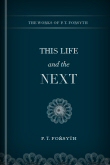
“I am not proposing to speak about the grounds in this life of a belief in another, but about the reaction of that belief upon this life.” P. T. Forsyth’s This Life and the Next is a rich and rewarding study of the impact the belief in immortality should have on the conduct of one’s present life. The doctrine of immortality must not be a doctrine for the end of life; instead, it must be a working principle in our everyday lives.
There is more clear thinking and logical reasoning in this small volume than in a dozen of the average books on religious subjects. Everyone who believes in immortality, or would like to believe in it, should read Professor Forsyth’s conclusions on the possibility of our being able to live in Eternity here and now.
—American Review
We know of no other book of equal size on this great and timely theme so profound in its insight and practical in its suggestions.
—Biblical World
P. T. Forsyth occupies a high plane of close and accurate reasoning in This Life and the Next. It is not the milk of the work, but the strong meat, and is for men, not babes.
—Springfield Republican
Dr. Forsyth is always fresh and vital but never more so than here. This is a book one does not wish to put down till he has finished.
—Baptist World
A brilliant discussion of the reaction of the next life upon this. A book that pulsates with spiritual energy.
—Baptist World
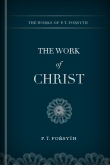
A rising trend in churches are favoring an undogmatic Christianity which is without apostolic or evangelical substance, cultivating a certain emulsion of sympathetic mysticism, intuitional belief, and benevolent action. Among lay minds of a devout and social but impatiently practical habit, this is likely to spread, particularly among those whose public interests get the upper hand of ethical and historical insight and denude their religion of most of the reflection it demands. A healthy church cannot survive with these principles.
It is upon faith alone, given by the cross alone, that a church can live—upon a positive New Testament Gospel. Of that Gospel the church is the trustee. The work of Christ, rightly understood, is the final spiritual condition of all the work we may aspire to do in converting society to the kingdom of God. In seven lectures, Forsyth argues for the steadfastness of the church, and for the re-focus of its teachings to be once again Christ centered.

This little volume contains two essays from P. T. Forsyth. The first is “The Holy Father,” an essay on John 17:11. The second essay is “The Living Christ,” an essay on Revelation 1:17–18.
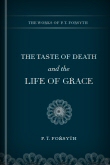
The Taste of Death and the Life of Grace is divided into two parts. The first is based on Hebrews 2:9, Christ’s tasting death for all. The second part is on Philippians 2:5–8, Christ’s emptying of himself in the Incarnation.
Here Dr. Forsyth shows himself among the foremost living theologians. To keen psychological analysis and deep moral insight suffused with warm feeling is added a rare gift of literary expression.
—New Outlook
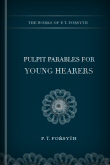
Religion as presented to the young is too often despoiled of its grace and mystery in the anxious effort to make it more easily understood. The effort to make religious truth both simple and definite may be so far overdone as to permanently belittle the child’s ideas of things spiritual and eternal. Forsyth, in the Pulpit Parables for Young Hearers, hopes to avoid these pitfalls by enlisting the king-faculty of imagination in the service of faith. For this reason, the little allegories in the book are not always minutely explained—something has been left for the young readers to discover, either alone, or with the help of their elders. Contains 24 addresses.
Parents, teachers, and ministers should not fail to have this.
—Bookseller
It is a book to be commended to the attention of all who have to do with the spiritual instruction of young people.
—Publishers’ Circular
Very useful to young people.
—British Weekly
The best of its kind that has appeared.
—Manchester City News
P. T. Forsyth (1848–1921) was born in Aberdeen, Aberdeenshire, Scotland. He was educated at the University of Aberdeen and the University of Göttingen. He was an ordained Congregational minister, and he served in various churches before accepting the post as principal of Hackney College, London. He was also a member of the theological faculty of London University. In 1905, he was elected chairman of the Congregational Union of England and Wales. Forsyth’s prolific works continue to be reprinted today, and his ideas are largely thought to have anticipated, and mirrored, the neo-orthodox movement of Karl Barth and Emil Brunner.
Reviews
2 ratings

Walter H. Davis Sr
8/21/2013

RevSarge
8/5/2013